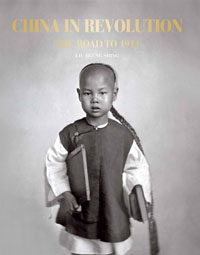China in Revolution – The Road to 1911
Posted: October 26th, 2011 | No Comments »A new book of photographs to tie in with the centenary of Xinhai edited by HS Liu – China in Revolution. The publisher sent out the blurb without any samples of the photos in the book, which is never a very good idea!! So can’t comment on the contents except to say that HS usually puts together great books and I was fortunate enough last year to be asked to contribute a foreword to his (and Karen Smith’s) book of photographs on Shanghai: A History in Photographs, 1842-Today. China in Revolution is also blurbed by Peter Hessler who I’m sure is very good but as far as I know has no great or intimate knowledge of 1911 or photography, so take that with a pinch of salt. Surely some blurbers with more direct knowledge of the historical period and media form would have been better? Still, there are several essays in the book by scholars of the period. Details below as ever.
The 1911 Revolution ended dynastic rule in China and paved the way for the founding of Asia’s first republic. Triggered by an accidental bomb explosion in Wuchang (modern-day Wuhan), the revolution marked the culminating point of decades of internal rebellion, foreign aggression and political decline; its leaders drew on a ferment of reformist and revolutionary ideas produced by some of China’s greatest modern thinkers. Although 1911 did not resolve China’s problems, it changed the country for ever, clearing a path for modernisation, and making possible the more decisive revolution of 1949.
China in Revolution assembles a remarkable survey of historical photographs from leading collections around the world. The images stretch from the Second Opium War to the Boxer Rebellion and wars with Russia and Japan, the outbreak of revolution, through the rise and fall of Yuan Shikai and the ensuing warlord era.
Accompanying an introductory essay by the editor Liu Heung Shing are essays from three scholars of revolutionary China — Joseph Esherick of UC San Diego, Zhang Haipeng of the Chinese Academy of Social Sciences, and Max K.W. Huang of the Academia Sinica — reflecting on the causes, achievements and failures of 1911, and its enduring meaning.

Leave a Reply